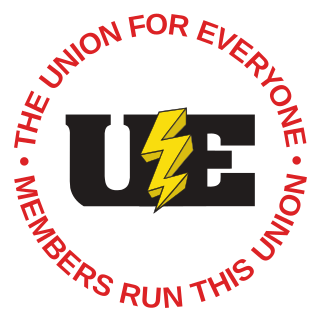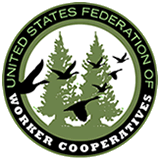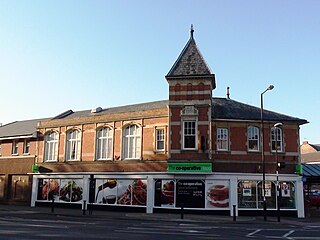Related Research Articles
A trade union or labor union, often simply referred to as a union, is an organization of workers whose purpose is to maintain or improve the conditions of their employment, such as attaining better wages and benefits, improving working conditions, improving safety standards, establishing complaint procedures, developing rules governing status of employees and protecting and increasing the bargaining power of workers.

A cooperative is "an autonomous association of persons united voluntarily to meet their common economic, social and cultural needs and aspirations through a jointly owned and democratically-controlled enterprise". Cooperatives are democratically controlled by their members, with each member having one vote in electing the board of directors. They differ from collectives in that they are generally built from the bottom-up, rather than the top-down. Cooperatives may include:
Collective bargaining is a process of negotiation between employers and a group of employees aimed at agreements to regulate working salaries, working conditions, benefits, and other aspects of workers' compensation and rights for workers. The interests of the employees are commonly presented by representatives of a trade union to which the employees belong. A collective agreement reached by these negotiations functions as a labour contract between an employer and one or more unions, and typically establishes terms regarding wage scales, working hours, training, health and safety, overtime, grievance mechanisms, and rights to participate in workplace or company affairs. Such agreements can also include 'productivity bargaining' in which workers agree to changes to working practices in return for higher pay or greater job security.

The United Auto Workers (UAW), fully named International Union, United Automobile, Aerospace and Agricultural Implement Workers of America, is an American labor union that represents workers in the United States and southern Ontario, Canada. It was founded as part of the Congress of Industrial Organizations (CIO) in the 1930s and grew rapidly from 1936 to the 1950s. The union played a major role in the liberal wing of the Democratic Party under the leadership of Walter Reuther. It was known for gaining high wages and pensions for automotive manufacturing workers, but it was unable to unionize auto plants built by foreign-based car makers in the South after the 1970s, and it went into a steady decline in membership; reasons for this included increased automation, decreased use of labor, mismanagement, movements of manufacturing, and increased globalization. After a successful strike at the Big Three in 2023, the union organized its first foreign plant (VW) in 2024.

The Canadian Labour Congress, or CLC is a national trade union centre, the central labour body in Canada to which most Canadian labour unions are affiliated.
A political organization is any organization that involves itself in the political process, including political parties, non-governmental organizations, and special interest advocacy groups. Political organizations are those engaged in political activities aimed at achieving clearly-defined political goals, which typically benefit the interests of their members.
A worker cooperative is a cooperative owned and self-managed by its workers. This control may mean a firm where every worker-owner participates in decision-making in a democratic fashion, or it may refer to one in which management is elected by every worker-owner who each have one vote. Worker cooperatives may also be referred to as labor-managed firms.

The United Electrical, Radio and Machine Workers of America (UE), is an independent democratic rank-and-file labor union representing workers in both the private and public sectors across the United States.

The United States Federation of Worker Cooperatives (USFWC) is the national grassroots membership organization representing worker cooperatives and democratic workplaces. Its mission is to build a thriving ecosystem for worker-owned and controlled businesses and to empower their cooperative leaders to power movements for racial justice and economic democracy. USFWC was founded in 2004 by few core co-op members in collaboration with co-op developers, scholars, community organizers, and supporters from the wider co-op sector.

Labor unions represent United States workers in many industries recognized under US labor law since the 1935 enactment of the National Labor Relations Act. Their activity centers on collective bargaining over wages, benefits, and working conditions for their membership, and on representing their members in disputes with management over violations of contract provisions. Larger labor unions also typically engage in lobbying activities and electioneering at the state and federal level.

Union busting is a range of activities undertaken to disrupt or weaken the power of trade unions or their attempts to grow their membership in a workplace.

A consumers' co-operative is an enterprise owned by consumers and managed democratically and that aims at fulfilling the needs and aspirations of its members. Such co-operatives operate within the market system, independently of the state, as a form of mutual aid, oriented toward service rather than pecuniary profit. Many cooperatives, however, do have a degree of profit orientation. Just like other corporations, some cooperatives issue dividends to owners based on a share of total net profit or earnings ; or based on a percentage of the total amount of purchases made by the owner. Regardless of whether they issue a dividend or not, most consumers’ cooperatives will offer owners discounts and preferential access to goods and services.

Cooperativeeconomics is a field of economics that incorporates cooperative studies and political economy toward the study and management of cooperatives.

The American Federation of State, County and Municipal Employees (AFSCME) is the largest trade union of public employees in the United States. It represents 1.3 million public sector employees and retirees, including health care workers, corrections officers, sanitation workers, police officers, firefighters, and childcare providers. Founded in Madison, Wisconsin, in 1932, AFSCME is part of the AFL–CIO, one of the two main labor federations in the United States. AFSCME has had four presidents since its founding.

The history of union busting in the United States dates back to the Industrial Revolution in the 19th century. The Industrial Revolution produced a rapid expansion in factories and manufacturing capabilities. As workers moved from farms to factories, mines and other hard labor, they faced harsh working conditions such as long hours, low pay and health risks. Children and women worked in factories and generally received lower pay than men. The government did little to limit these conditions. Labor movements in the industrialized world developed and lobbied for better rights and safer conditions. Shaped by wars, depressions, government policies, judicial rulings, and global competition, the early years of the battleground between unions and management were adversarial and often identified with aggressive hostility. Contemporary opposition to trade unions known as union busting started in the 1940s, and continues to present challenges to the labor movement. Union busting is a term used by labor organizations and trade unions to describe the activities that may be undertaken by employers, their proxies, workers and in certain instances states and governments usually triggered by events such as picketing, card check, worker organizing, and strike actions. Labor legislation has changed the nature of union busting, as well as the organizing tactics that labor organizations commonly use.

Economics of participation is an umbrella term spanning the economic analysis of worker cooperatives, labor-managed firms, profit sharing, gain sharing, employee ownership, employee stock ownership plans, works councils, codetermination, and other mechanisms which employees use to participate in their firm's decision making and financial results.
An Employee Stock Ownership Plan (ESOP) in the United States is a defined contribution plan, a form of retirement plan as defined by 4975(e)(7)of IRS codes, which became a qualified retirement plan in 1974. It is one of the methods of employee participation in corporate ownership.
Economic democracy is a socioeconomic philosophy that proposes to shift ownership and decision-making power from corporate shareholders and corporate managers to a larger group of public stakeholders that includes workers, consumers, suppliers, communities and the broader public. No single definition or approach encompasses economic democracy, but most proponents claim that modern property relations externalize costs, subordinate the general well-being to private profit and deny the polity a democratic voice in economic policy decisions. In addition to these moral concerns, economic democracy makes practical claims, such as that it can compensate for capitalism's inherent effective demand gap.
Social ownership is a type of property where an asset is recognized to be in the possession of society as a whole rather than individual members or groups within it. Social ownership of the means of production is the defining characteristic of a socialist economy, and can take the form of community ownership, state ownership, common ownership, employee ownership, cooperative ownership, and citizen ownership of equity. Within the context of socialist economics it refers particularly to the appropriation of the surplus product produced by the means of production to society at large or the workers themselves. Traditionally, social ownership implied that capital and factor markets would cease to exist under the assumption that market exchanges within the production process would be made redundant if capital goods were owned and integrated by a single entity or network of entities representing society. However, the articulation of models of market socialism where factor markets are utilized for allocating capital goods between socially owned enterprises broadened the definition to include autonomous entities within a market economy.
Workplace democracy is the application of democracy in various forms to the workplace, such as voting systems, debates, democratic structuring, due process, adversarial process, and systems of appeal. It can be implemented in a variety of ways, depending on the size, culture, and other variables of an organization.
References
- ↑ Canadian Worker Co-op Federation - Unionized Co-ops Archived January 4, 2009, at the Wayback Machine
- 1 2 Bell, Dan "Worker-Owners and Unions --Why Can't We Just Get Along?" "ZNet |Labor | Worker-Owners and Unions". Archived from the original on September 29, 2007. Retrieved July 22, 2009.
- ↑ A Strategy for Unions and Coops: Toward Building A Labor-Ownership Economy By Lisa Stolarski
- ↑ Unions & Cooperatives: Allies in the Struggle to Build Democratic Workplaces By Lisabeth L. Ryder